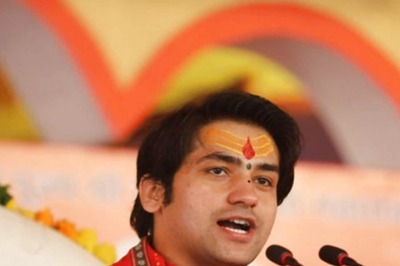
views
Bollywood cannot pretend to be naïve, let alone utterly innocent or unaware of the hidden or not so hidden messaging of its themes, images, or lyrics. Take the recent controversy over the song, “Besharam Rang”, from the yet-to-be-released film Pathaan. The movie, starring Shah Rukh Khan and Deepika Padukone, scheduled for release on 25 January 2023, the eve of Republic Day, already finds itself embroiled in a maelstrom of outrage.
The title itself, in typical Bollywood style, stereotypes an entire community. You don’t have to refer to Zanjeer (1973) or, more recently, My Name is Khan (2010), or even to see the movie itself to guess that the stereotype is most likely positive. Yes, Bollywood cannot as yet dare to do a film on the horrors unleashed by the Taliban. While we are still guessing at what actually happens in Pathaan, the story line, from what one gathers, seems a rehash of Ek Tha Tiger (2012). Another spy thriller from the same production house, Yash Raj Films.
This is hardly surprising because nothing g is really new in Bollywood. Most films are based on some well-worn and time-tested “formula.” Both Ek Tha Tiger and Pathaan have Indian intelligence officers, played by Salman and Shah Rukh Khan, who must be shown as utterly loyal to India. In the former, however, the lady love, played by Katrina Kaif, is a Pakistani spy. The film ends with the couple disappearing in an apparently Middle Eastern foreign country where they can live and love in peace.
But a formula, to succeed, must have some differences too. Else, how to introduce novelty? Tiger’s hero was Avinash “Tiger” Singh Rathore, a quintessential Rajput and thus another Bollywood martial stereotype. The hero of Pathaan is — yes, you don’t have to be a genius to guess — a Pathan. His father had rescued a Hindu family during Partition. Now the son serves the Indian state. His significant other, played by Padukone, is not a Pakistani spy this time around, but an Indian police officer.
“Besharam Rang”, a song from the movie, was recently released, possibly to test the waters and create some publicity. Preferably positive but at least negative publicity, a buzz around the would-be blockbuster before its release. True to expectations, the song has already attracted a ton of controversy, not to mention negative publicity. Even BJP Minister of State for Home, Ajay Kumar Mishra, and UP Chief Minister, Yogi Adityanath, have weighed in against it.
But isn’t it true that when it comes to the movie market, there is, after all, no such thing as bad or too much publicity. At least this used to be the standard assumption, or should I say formula? Well, think again. Times have indeed changed. It is now widely accepted that a certain type of bad publicity can ruin a film, well in advance of its release. Aamir Khan’s mega flop, Lal Singh Chaddha (2022) is cited as a prime recent example. It is, arguably, a minoritarian remake of Forrest Gump (1994), subtly even if not overtly anti-Hindu.
It also has strange improbabilities and possibly negative stereotypes such as a Sikh graduate of Delhi’s prestigious Hindu College being unable to speak any other language than Bollywood pidgin Punjabi. Or his best Army buddy, a stereotypically “South Indian” man named Bala (or boy), being not only intellectually challenged but multi-generationally obsessed with making men’s hosiery. The string of Bollywood flops, with revenue share of more “authentic” mega hits from beneath the Vindhyas outstripping Bombay cinema, should certainly have been a wake-up call. Perhaps, something is not quite right with Bollywood’s “Ganga-Jamuni” formula?
Now let’s come to the song itself, starting with its lyrics. The key lines are: “Hamein To Loot Liya Milke/Ishq Waalon Ne…Nasha Chadha Jo Sharifi Ka/Utaar Feka Hai/Besharam Rang Kahan Dekha/Duniyan Waalon Ne.” A rough and ready translation should suffice: “We’ve been looted by love makers…we have stripped and discarded the intoxicant of virtue. The world is yet to see our shameless hue.” As if to forestall any further doubts, the actor croons her “wrong” intent: “Hai Jo Sahi Woh Karna Nahin/Ghalat Hone Ki Yehi To Shuruwat Hai.” What is right, that is not done; this is verily the start of being wicked.” Words most parents would find objectionable, especially when it comes to the sexual mores of their wards.
Now to the imagery. Some of these lines are pictured on Padukone in a close-to-saffron skimpy dress, which leaves very little to the imagination.
True that the film has passed the Indian Censor Board. So why shouldn’t the matter rest there? After all, more supposedly obscene songs have been picturised in the past, including Raj Kapoor revealing respectively, although not necessarily respectfully, both Zeenat Aman’s and Mandikini’s thighs and bosoms as far back as Satyam Shivam Sundaram (1978) and Ram Teri Gang Maili (1985). And Kapoor was the doyen of the Hindi film industry, feted by the government-given Dada Saheb Phalke Award.
But times, as I said earlier, have changed. The hidden — and not so hidden — messaging of Bollywood has come in for such scrutiny that audiences will read even more into such sensitive scenes, not to mention colours, than ever before. Not only audiences but influencers will also weigh in on these issues, calling for the boycott, as we have seen, of films or even film stars and production houses.
What is the way out? When it comes to Pathaan, one damage control mechanism could be to change the colour of Padukone’s dress — or should we say undress — in that particular clip. But if it were to be changed, say, from saffron to green, I am sure all hell would break loose. We already have some sections of the Muslim ulema in India complaining that Pathaan insults not just Pathans but Muslims, showing them in a vulgar and unflattering light.
Therefore, just changing the colour of one skimpy costume or even offensive lyrics will not probably suffice. The whole “formula” has come under question. The faintest whiff of anti-Hindu sentiments or implications will not go down well with a much more religiously charged, not to mention awakened, majority in India. If Pathaan flops, I am sure Bollywood will take head. Better late than never?
The writer is an author, columnist and professor at Jawaharlal Nehru University. Views are personal.
Read all the Latest Opinions here




















Comments
0 comment